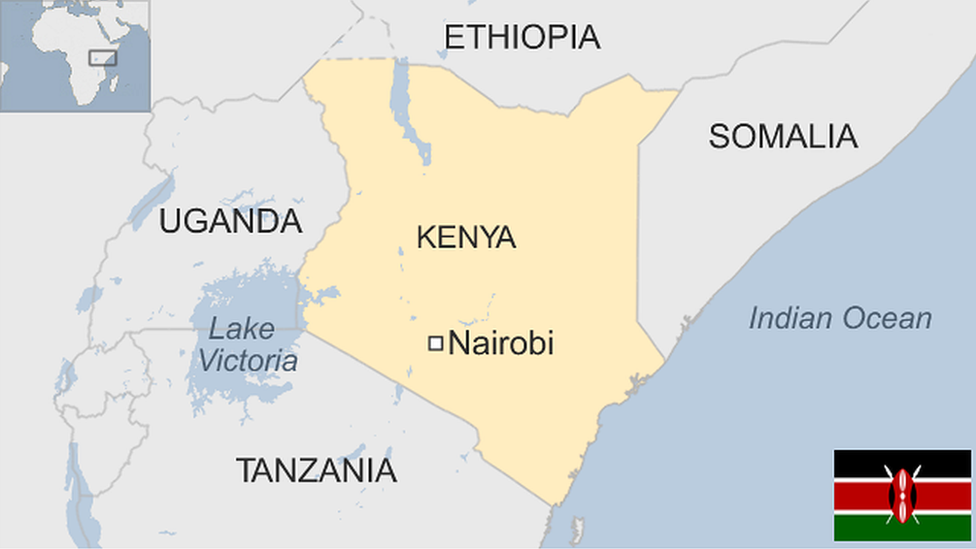Letter from Africa: Party time in Kenya
- Published
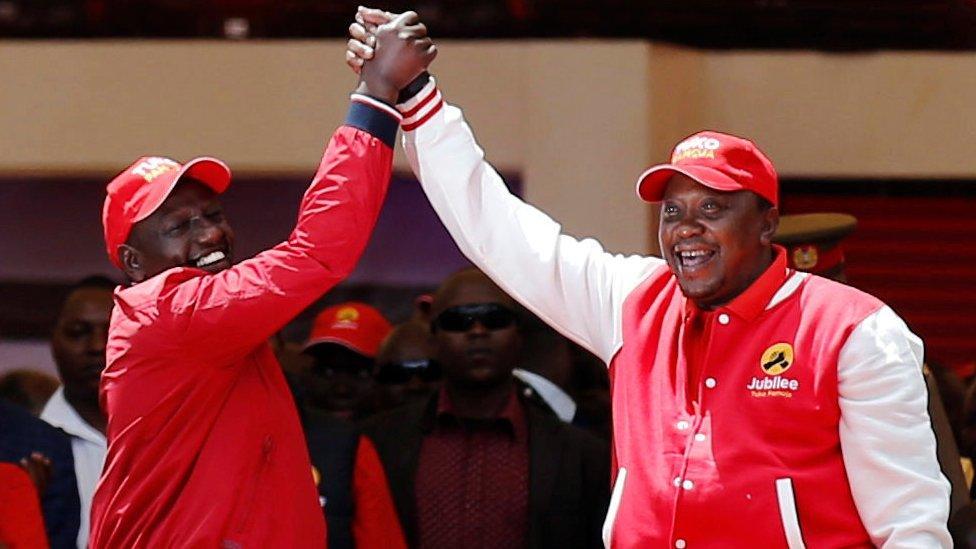
President Uhuru Kenyatta (R) and his deputy William Ruto have formalised their union
In our series of letters from African journalists, social commentator Joseph Warungu asks why Kenya's governing coalition has launched its new Jubilee Party.
After about six years of courtship, the political marriage between Kenya's President Uhuru Kenyatta and his deputy William Ruto has finally been solemnised and consummated.
The couple now has a healthy, bouncing baby known as Jubilee.
It was born on Saturday, weighing an incredible 12kg (the number of political parties that merged to create Jubilee).
In Mr Kenyatta's Kikuyu culture, the birth of a baby boy is welcomed with five loud ululations by the women present.
Some of Kenya's leading gospel and secular artistes and comedians were on hand to raise the decibel metre, as they led the crowds of thousands in celebrating the birth.
And in Mr Ruto's Kalenjin customs, a baby boy is sprinkled with traditional beer by the elders as a sign of blessing.
The Jubilee launch did not spare a coin in its sprinkle.
The well-fed boy was floating on the millions of shillings spent on the lavish ceremony; from high-end vehicles with comprehensive branding, to extensive catering for the masses and cash allowances for the thousands of delegates who attended.
'Come-we-stay' partnership
But now the hard work begins - to ensure baby Jubilee lives up to expectation and delivers political victory for its parents.
Prior to Saturday, Mr Kenyatta and Mr Ruto were living in what Kenyans call a "come-we-stay" relationship - an unofficial marriage that has not been endorsed by the parents.
The pair came together informally in early 2011 when the rival communities they represent decided to bury their differences, which were at their most destructive when hundreds of people died and thousands others were displaced following the disputed elections of 2007.
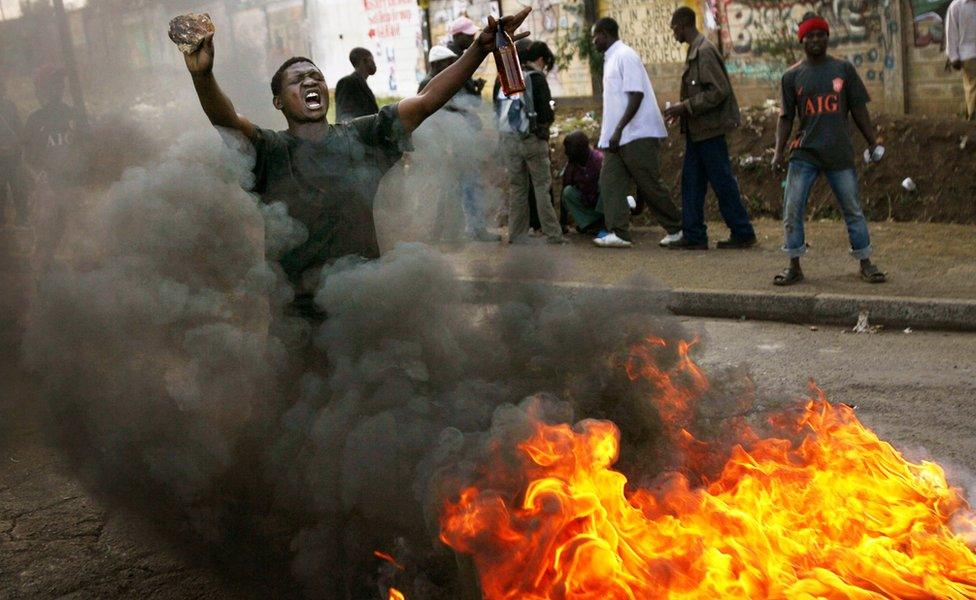
Violence followed the disputed 2007 elections
The two men went on joint rallies across the country to preach peace and heal the bitter rift between their two communities.
The rallies then took on an urgent stride as both men faced charges of crimes against humanity at the International Criminal Court (ICC).
The cases were later dropped.
Mr Kenyatta's political parent is The National Alliance (TNA), which he used to secure the presidency in 2013, while Mr Ruto became his deputy running under his own United Republican Party (URP).
TNA and URP are now dead and Mr Kenyatta and Mr Ruto are one - assuming the roles of Jubilee party leader and deputy respectively.
Now Mr Kenyatta and Mr Ruto have to attend to the duties every parent faces - ensuring baby Jubilee is vaccinated against all forms of political threats and gets a good education to attain the grades needed to secure victory in the 2017 election.
On the face it, Jubilee appears to be a platform to simply retain power in a convincing win next year.
To do this Jubilee needed to have more national outlook beyond its mainly Kikuyu and Kalenjin core support.
And so Mr Kenyatta and Mr Ruto have been on a sustained charm offensive to parts of the country and communities that tend to support the opposition such as the Coastal region.

Joseph Warungu:

"The new party is really about one man and one issue: William Ruto and the 2022 general election."

The harvest was plentiful.
Twelve parties folded up, gave up their identity and turned red - the colour of Jubilee.
More than 40 opposition legislators suddenly found reason to reject the parties that sent them to parliament or the Senate and decided that east or west Jubilee was best.
The Jubilee party is now confident that it is ready to take on the opposition in next year's election.
They are so confident that in his party launch address, President Kenyatta told the main opposition Cord coalition, led by Raila Odinga, that they should "get their act together so that we can face one another in a peaceful manner [during the election]".
Cord is yet to name its presidential candidate.
But at a deeper level the new party is really about one man and one issue: William Ruto and the 2022 general election.
He, more than President Kenyatta, will need this new platform the most.
Deep pockets
Many observers argue that although the real brutal and unpredictable competition will be at the local county level, at national level President Kenyatta himself is in a strong position to win re-election in 2017 for several reasons.
His Jubilee party has very deep pockets and continues to command wide support from the Kikuyu and Kalenjin - the two communities that have been the only ones to occupy the presidency since the country's independence in 1963.
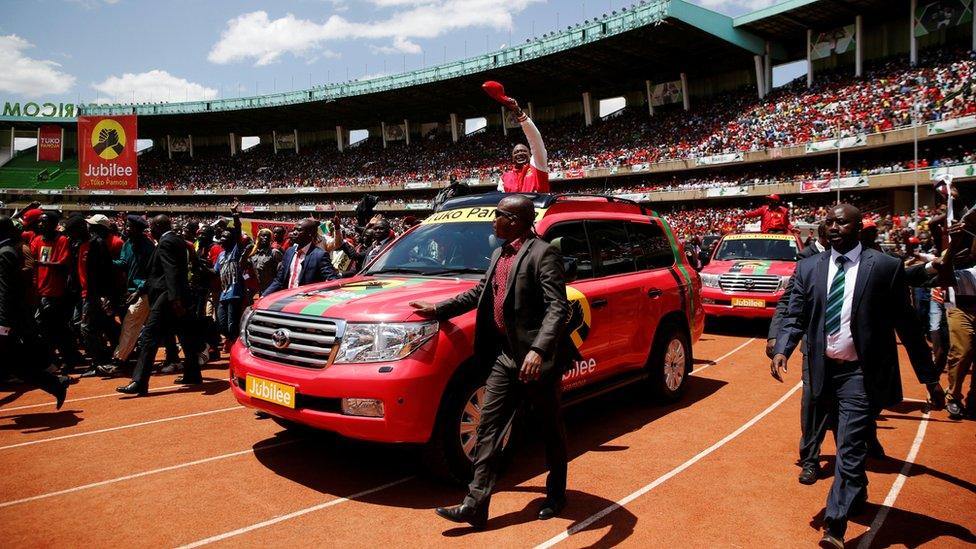
No expense was spared at the stadium announcement of the new party
Jubilee is in government and that comes with its advantages.
Jubilee has also made some inroads into parts of the opposition territory to woo other communities, and is working round the clock to try and deliver some of the commitments it made in its 2013 election manifesto.
But most importantly, the opposition has not taken political advantage of some of Jubilee's failures including its poor record in fighting corruption, weak rule of law and the continued growth of nepotism and tribalism in public appointments.
Mr Kenyatta has one more thing going for him - very few African incumbents lose elections. When they do, it's out of carelessness or empty pockets.
So Mr Ruto is looking beyond 2017 to the 2022 election, when he is meant to replace Mr Kenyatta as the Jubilee presidential candidate.
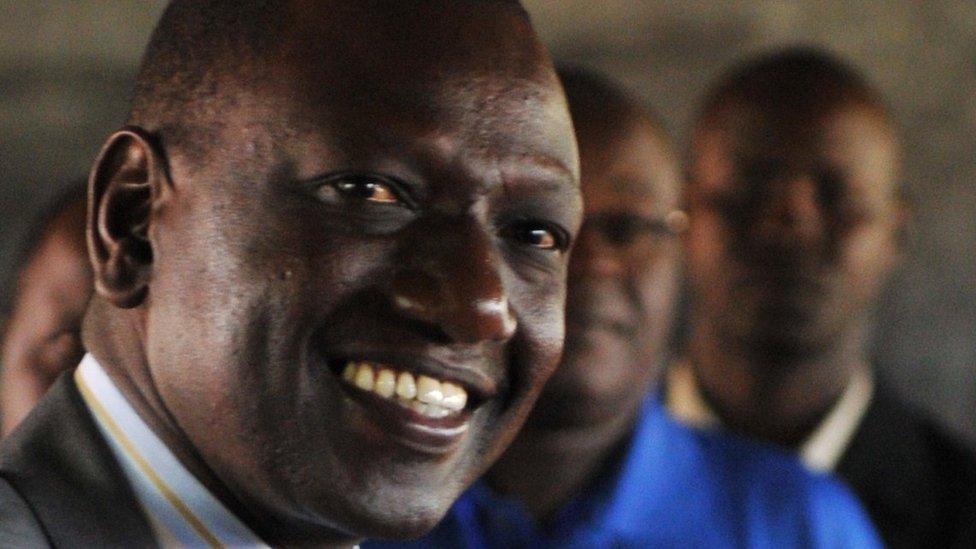
Has the deputy president got his mind set on becoming president in 2022?
He needs the new binding Jubilee platform because he cannot fully trust his Kikuyu political "in-laws" to back him the way he's backed them up to now.
In the recent past there were prominent Kikuyu politicians who openly said Mr Ruto should not count on automatic Kikuyu support when his turn comes.
Secondly Kenyan politicians can be restless grasshoppers - jumping from party to party depending on where the grass is greenest.
The new Jubilee platform and a new law that prevents such party political hopping means those inside Jubilee will be locked in.
Thirdly, Mr Ruto is a bold politician who has a single focus on the big picture ahead.
His fearless march tends to leave bruised souls who would jump at any opportunity to oppose him.
His planning therefore is meticulous and does not leave things to chance.
In addition to the Jubilee platform, there is widespread talk in Kenya that he has placed his allies in key public institutions.
So with the birth of baby Jubilee, Mr Ruto and Mr Kenyatta are now in the business of changing diapers and buying lots of toys for the baby to ensure they themselves don't see red at the next election.

More from Joseph Warungu:
- Published4 July 2023
